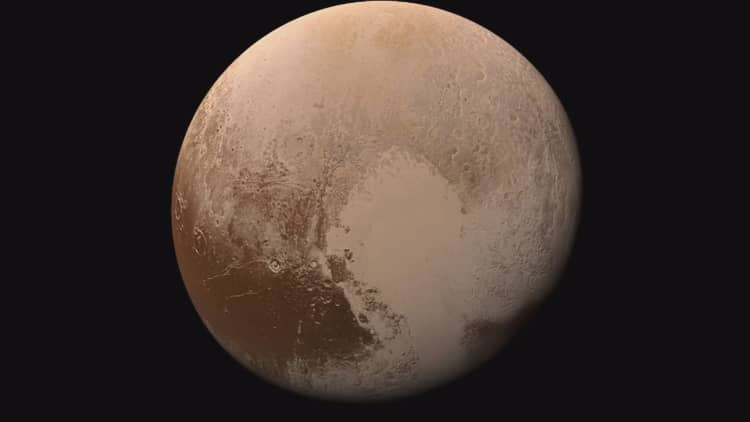Thanks to science fiction, and the activities of private companies like SpaceX and Blue Origin, the prospect of humans in deep space seems closer than ever.
While many people entertain the idea of traveling the universe, the concept is rosy but the dangers are sometimes downplayed. It raises the question of whether popular culture is overly romanticizing the stark realities of outer space — and all that's involved in living off Earth.
Enter "MARS," an ambitious National Geographic series that explores the idea of terraforming the red planet. Now in its second season, the show underscores the often grim challenges faced by a fictional team of astronauts charged with the responsibility of developing a functioning colony on Mars. By all indications, it's hardly a vacation in Las Vegas or the Caribbean.
NatGeo's project utilizes a hybrid storytelling format that fuses fiction and documentary-style segments, with the fictional narrative interspersed with interviews from real-life scientists, astronauts and sci-fi enthusiasts. In some ways, "MARS" can be seen as a version of MTV's "The Real World" — inviting the audience to imagine what happens when astronauts stop being polite, and start getting real.
At least for the moment, the show lacks the cultural import of something like "Star Trek," with its popular if not debatable trope involving the low-level crew member — usually clad in a red uniform — who dies before the opening credits even begin rolling.
However, "MARS" successfully drives home a bleak concept that arguably gets lost in the excitement over the next phase of space exploration: It won't be easy, and space isn't filled with glittering metropolises, massive spaceships and friendly aliens.
In fact, the hazards that await are likely to kill at least some of outer space's first pioneers.
"The mission to terraform a virgin planet comes with heavy adjustments, including how humans [will] cope with contamination, illness, death, natural disasters and even the first Martian baby," a synopsis of the second season of "MARS" reads.
To be certain, modern-day science fiction is suffused with lots of cautionary tales of what can go wrong with space exploration, and what occurs when technology and human nature take a darker turn. For example, Netflix's "Lost in Space" reboot features a host of unknown dangers astronauts face on other planets (including toxic ecosystems and killer robots).
The negative implications of technology and space travel is enough to make Andy Weir — a sci-fi author who serves as a consultant for NatGeo's "MARS" and who wrote the best-selling "The Martian" — think society is bordering on "technophobia."
Much of science fiction "has been taken over by miserable, dystopian stuff," Weir told CNBC recently. "There's very little science fiction going on nowadays that has a positive message or a happy world that you'd actually like to live in."
While not outright apocalyptic, "MARS" shows the underbelly of colonizing another planet, and all that can go awry when humanity is faced with the unknown, and high tech is thrown in the mix. For his part, Weir acknowledged the downsides of technology, but insisted that "I don't think that's how technology ends up working."
He cited instances in the development of medicine, energy and other areas where "the positive applications, in practice, dramatically outweigh the negative applications."
Becoming 'a guinea pig'
For its part, NASA has acknowledged the real dangers of living off-planet, having come up with a comprehensive list of the dangers that await humans attempting to rocket to other locations beyond the Earth's orbit.
The space agency's list reads like a compendium of every sci-fi-horror film ever created, and include risks like radiation exposure, extended periods of isolation from other humans and the effects of gravity. According to experts, none of those possibilities can be taken for granted.
"There are a lot of physical effects that happen in micro-gravity," Leland Melvin, a former NASA astronaut who works with NatGeo, told CNBC at an event for "MARS" recently. Loss of gravity can wreak havoc on the human body, he said, including changes in vision, the nervous system and bone density.
"In space, your bones stop growing," Melvin said. "Gravity makes you feel weight, and your bones feel the reaction ... and that keeps your bones. In space, the calcium leeches out of your bones and they become osteoporotic and brittle." Biological changes in space can even extend to changing the composition of human organs, which Melvin said can result in a human heart shrinking.
As depicted in "MARS," the red planet's unique ecosystem is likely to compound the problems space travelers will face. "You can't breathe the Martian atmosphere, you're inside most of the time," Melvin said. "What happens when you're off Earth most of the time? What's going to happen psychologically?" he asked.
Deeper journeys into space may well heighten the risks for humans, but "we don't have the data. Until you get the data, do you really know? That's why we're constantly doing research [with astronauts] as a guinea pig," Melvin added.



